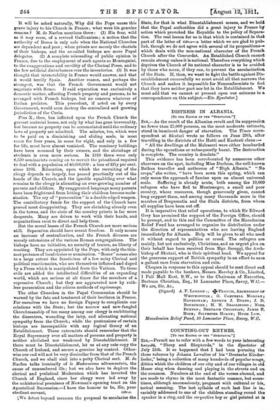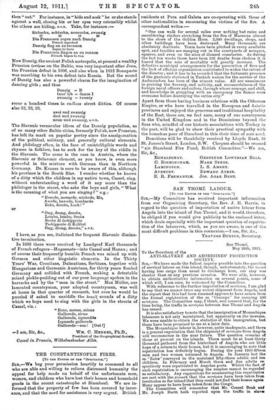COUNTING-OUT RHYMES.
[To THE EDITOR OP TEE "EPROTATOR."1
Sisa—Permit me to refer with a few words to your interesting Sta.rpi/36, "Sheep and Shepherds," in the Spectator of July 15th. It so happened that I had been perusing the three volumes by Johann Lewalter of his "Deutsche Kinder- lieder," being a collection of many hundreds of popular songs, ditties which the children of our city and of our villages in old Hesse sing when dancing and playing in the streets and on the common. Numbers at the end of the verses abound, and are made to rhyme in the most fantastic manner, but some- times, although unconsciously, pregnant with cultural or his_ torical meaning. The last syllable of each last line is in. variably addressed to one of the children standing round the speaker in a ring, and the respective boy or girl pointed at is
then "out." For instance, in " hide and seek" he or she stands against a wall, closing his or her eyes very ostensibly whilst the others are hiding, sc.r.a. Take, for instance achtzehn, neunzehn, zwanzig
17 18 19 80 Die Franzosen zogen msch Danzig French marched
Danzig fing an zu brennen
began to burn
Die Franzosen fingen an zu rennen French began to run Now Danzig, the ancient Polish metropolis, at present a wealthy Prussian J1ewropeps on the Baltic, was very important after Jena, the Prussian defeat in 1806, and also when in 1812 Bonaparte was marching to his own defeat into Russia. But the sound of Danzig has also a powerful charm for the imagination of dancing girls ; and thus Danzig = D tanz' ich = dance I zwanzig = twenty
recur a hundred times in endless street ditties. Of course
also 22, 23, 29, zwei and zwanzig drei and zwanzig
noun and zwanzig, K.T.A.
The Slavonic vernacular idiom of the Danzig population, as of so many other Baltic cities, formerly Polish, now Prussian, has left its mark on popular poetry since the amalgamation of the political, military, and generally cultural elements. And philology often, in the face of unintelligible words and rhymes in folklore, has to seek for the key of the riddle in the Slavonic. The same is the case in Austria, where the Slavonic or Sclavonic element, as you know, is even more powerful in the mixture with German than in Northern Germany. Dr. Krauss is sure to be aware of this, although his province is the South Slay. I wonder whether he knows of a ditty which the children in my native town, Cassel, sing, without understanding a word of it any more than the philologer in the street, who asks the boys and girls, " What is the meaning of what you are singing ? " e.g.: "Eenede, meenede, mickede, Me, Awede, bawede, bombardo Ecks, drecks, Loch! "
or
" Ong, drong, dreoka, Lembo, lembo, Seoka Seoka di tschipperie Tschipperie di Kolibri Ong, thong, dreoka," I have, as you see, italicized the frequent Slavonic diminu- tive termination.
In 1683 there were received by Landgraf Karl thousands of French refugees—Huguenots—into Cassel and Hanau ; and of course their frequently humble French was mixed up with German and other linguistic elements. In the Thirty Years' War, Croatians, Dalmatians, Serbians, together with Hungarians and Germanic Austrians, for thirty years flooded Germany and collided with French, making a detestable mixed pickle-pudding out of our poor language spoken in the barracks and by the " man in the street." Max Muller, our lamented countryman, your adopted countryman, was well at home in that quarter of researeh, but even he would be puzzled if asked to unriddle the iteaaft sounds of a ditty
which we boys used to sing with the girls in the streets of
Cassel, viz. : "Rene, meene, mieno
Gallerede, sieno Gallerede, ispusedds Ispusede gallerede Gallerede—aus / [Out!]
am, Sir, &c., WM. C. HENKEL, Ph.D.,
President of the Geographical Society.
Cassel in Prussia, Wilhelmshoeh,er



































 Previous page
Previous page